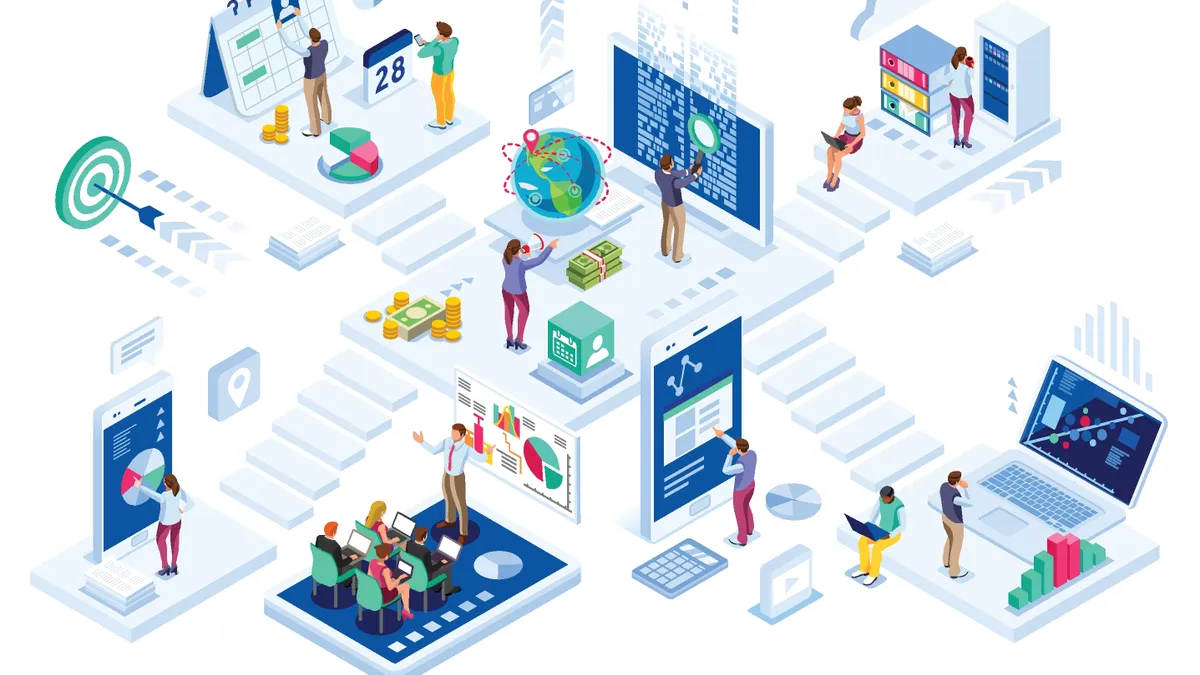Legal operations can do a better job improving the efficiency of in-house legal teams if the broader organization treats contract lifecycle management or other legal software as an enterprise-level technology, and that could happen in the near future, Marie Widmer, CEO of Amplifi Ops, says.
“I do think legal tech will become enterprise technology,” Widmer said in a podcast hosted by LinkSquares Chief Legal Officer Tim Parilla. “We’re nearing the point where CLM will be considered to the same degree of necessity as Salesforce or Coupa or NetSuite, and if you don’t have it, you’re obviously missing the mark.”
To get to that point, legal teams will be relying on their legal operations colleagues, but they face their own challenges, she said.
“There’s still a hierarchy issue, where we hear talk of lawyers versus non-lawyers,” said Widmer, who launched her company last year to help third-party consultants, in-house attorneys and legal tech companies work together to improve process and system outcomes. “Some legal ops teams still don’t get to report to a GC, but report to a mid- or junior-level attorney, don’t have consistent job description and don’t have a job matrix, so they don’t know what growth and promotion looks like. They don’t have standard courses or certification programs.”
Ideally, legal ops will start to look like privacy as a function, she said. “Privacy didn’t used to be a big field. Now there are chief privacy officers. But they had to build the IAPP [International Association of Privacy Professional] certification program. If we don’t move in that direction, we won’t be able to solidify who we are as an industry.”
Legal teams today still mostly act like law firms within an organization. The general counsel is typically a former outside counsel who brings a law firm mentality to the in-house role. That means there remains a sharp divide between lawyers and non-lawyers, and the lawyers don’t bring a process mindset to their job. That keeps them reactive – responding to needs that are brought to them – rather than taking a more proactive role by having a system in which their function fits into the broader whole in a consistent, predictable way.
“Legal has been a closed industry for a long time,” said Widmer, a former lawyer. “It’s been one of those gate-kept professions, so the barriers to entry are really high, the hazing continues to happen, and people that do make it through get into a law firm, where associates aren’t treated fairly and people get washed out.”
A lot of lawyers who move in-house do so under the impression the work-life balance will be better, but they bring their law firm experience with them, which she believes closes them off to processes and systems that can make their job easier.
“They carry all that trauma with them, coming in with the burnout, not knowing how to set appropriate boundaries,” she said. “They don’t succeed in the in-house role because they don’t fit into the culture of the company. They don’t know how to be a good manager. They don’t know how to get buy-in from people because … they’re not equipped for it.”
If they can learn to use systems and processes, legal can function in a manner more similar to other business functions, reducing their stress and freeing up their time. But that would require a willingness to allow more standardization in contracts – like a global nondisclosure agreement – and engaging with software tools on a regular basis.
“They’re starting to talk about legal design [more standardized contracts, among other things] and not over-negotiate contracts,” she said. “I would love to see that happen.”
Legal ops is still seen as more of a facilitator or administrative role that’s supposed to take some manual weight off the attorneys and be the friendly face of the legal team to the rest of the business. And while the function is that, it needs to gain more autonomy, otherwise it won’t be able to push through the efficiencies legal needs.
“Were starting to see legal ops become a standalone function within the legal team, with autonomy and direct line reporting, but we still have a long way to go,” she said. “The big thing that needs to change is, legal ops needs to make decisions sometimes that don’t favor legal. Legal ops is focused on how to help the business run better, make more money, operate more efficiently. That doesn’t always align with the mindset and interests of the attorneys.”
When she’s brought into an organization to help the legal team function better, she meets with the other function areas so she can see how the legal team is viewed and whether people create workarounds to minimize legal team involvement as an efficiency measure.
“I just want to understand politically where legal fits in the organization,” she said. “I set a meeting with finance and ask how the invoices are being reviewed, how they’re paid, how people are getting to you. That tells me how easy it is to get around legal.”
Eventually, the legal function will become more standardized with the help of technology and processes, and the in-house teams that embrace that will succeed, she suggested.
“Legal sits at the beginning and end of every company process whether they like it or not,” she said. “So, you can either write it down and memorialize it – take control of it and make it work for you – or continue to have it happen to you. Like with procurement. Legal is involved in that process. You can either advocate for your placement in the process, for a method of intake so you get to approve, or every time you’re going to battle when you get to review the procurement and go chase people who are going around you.”



















